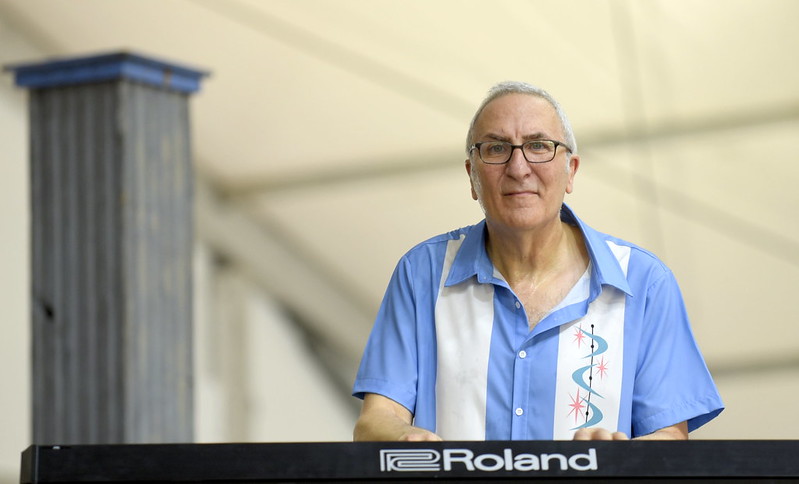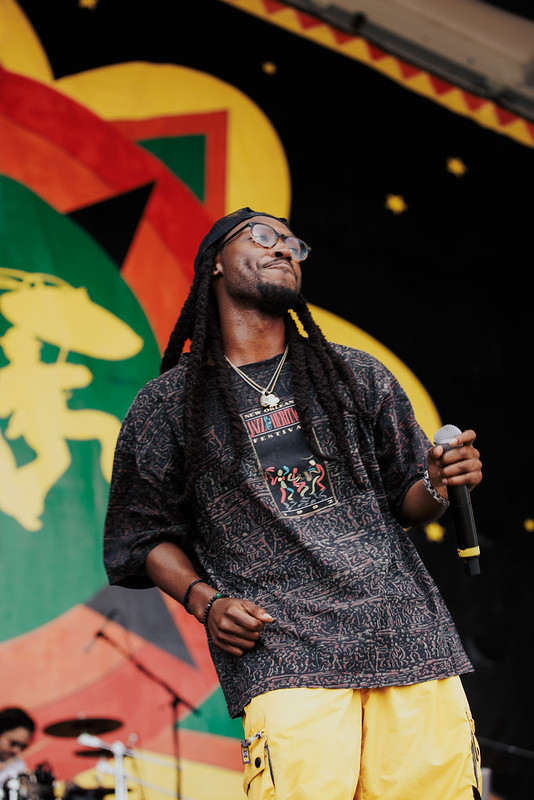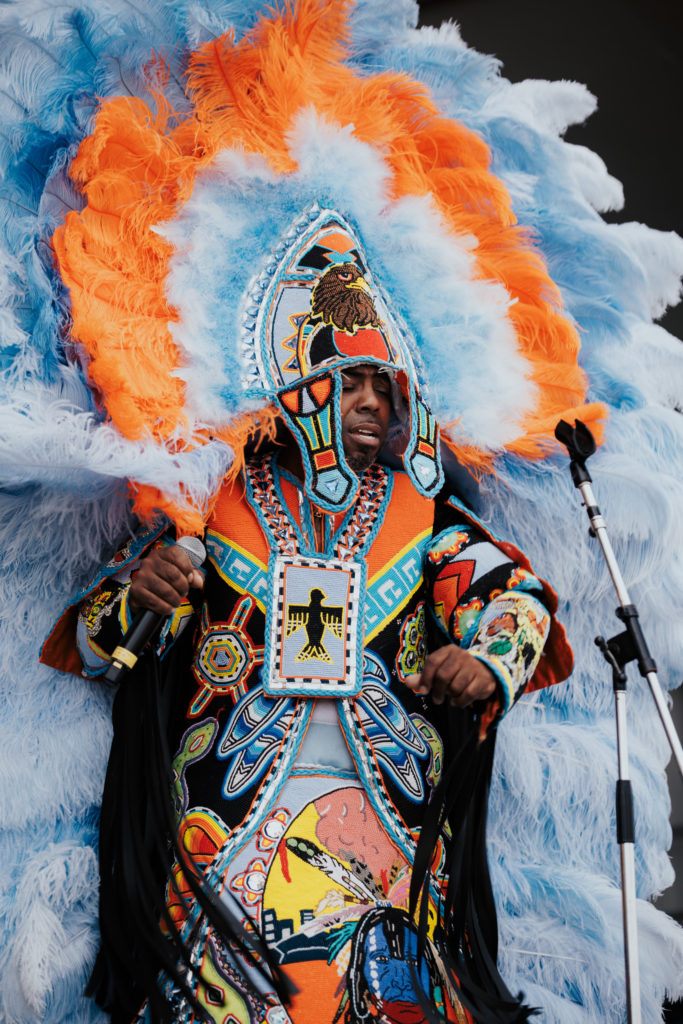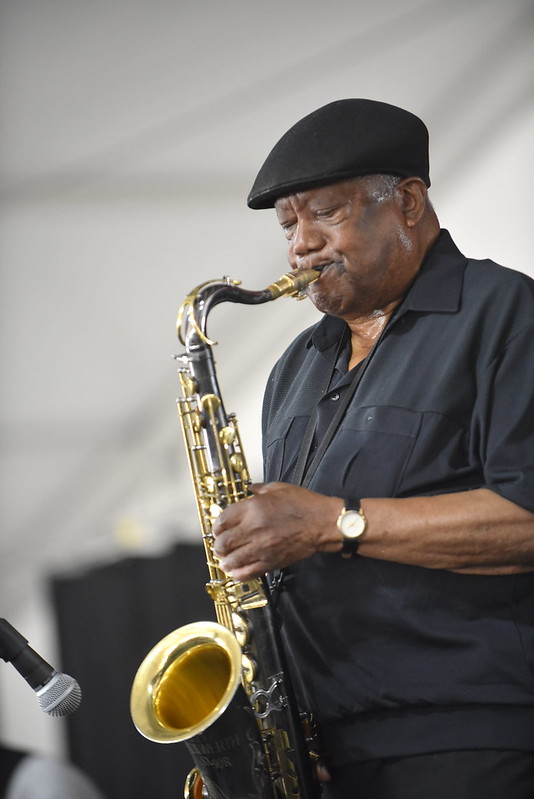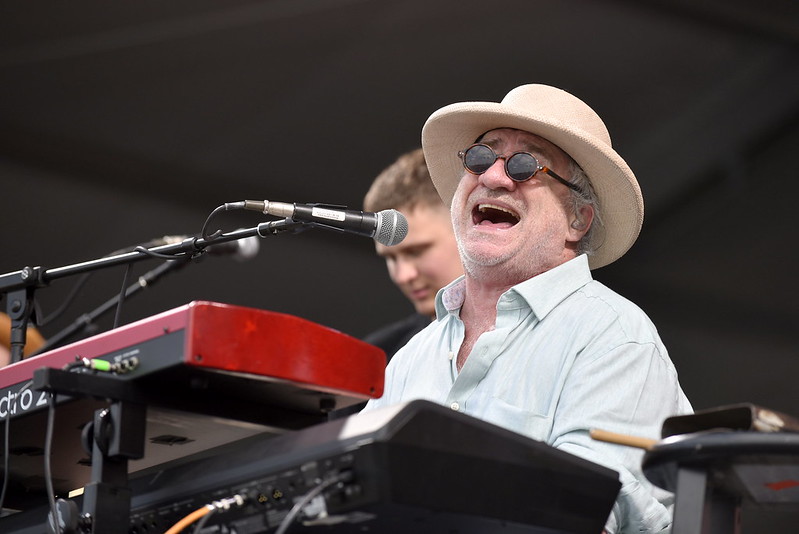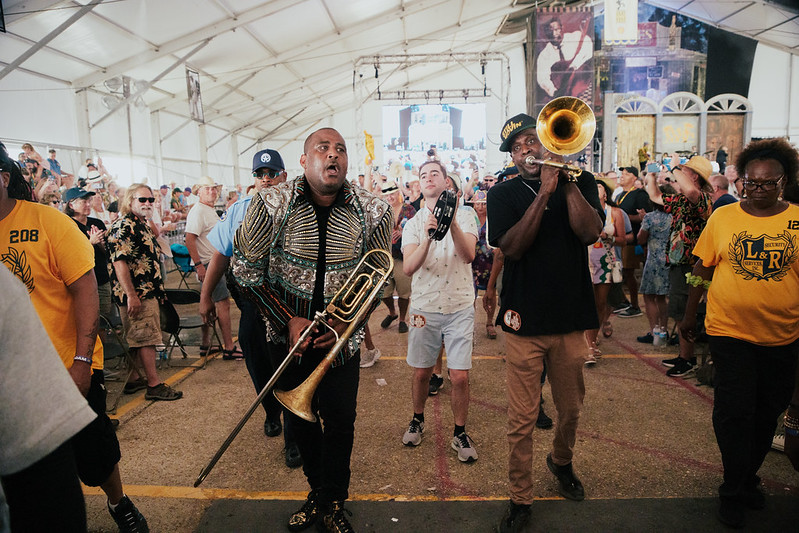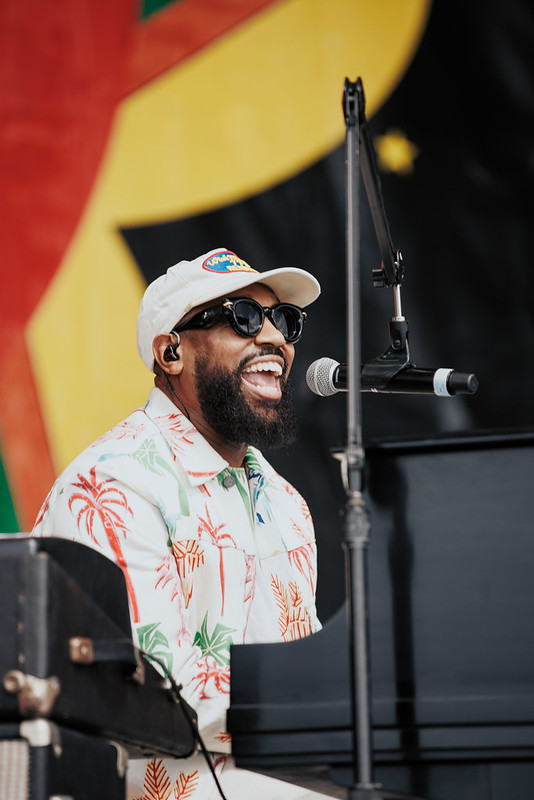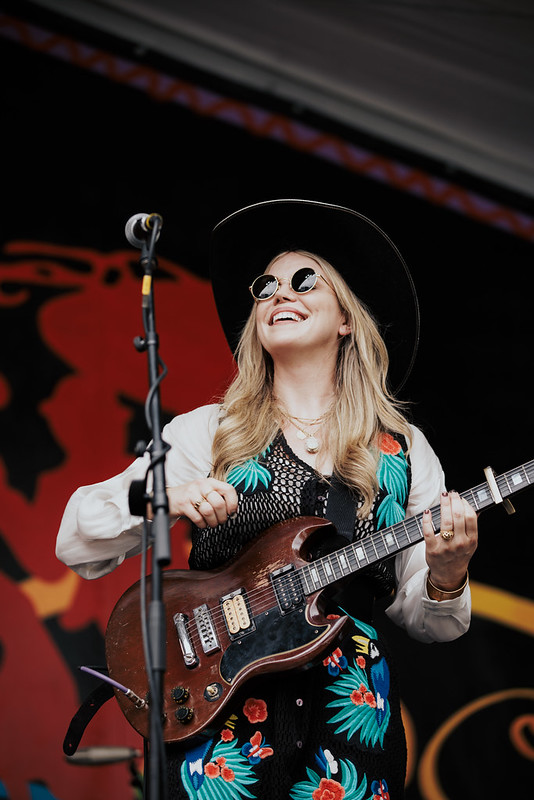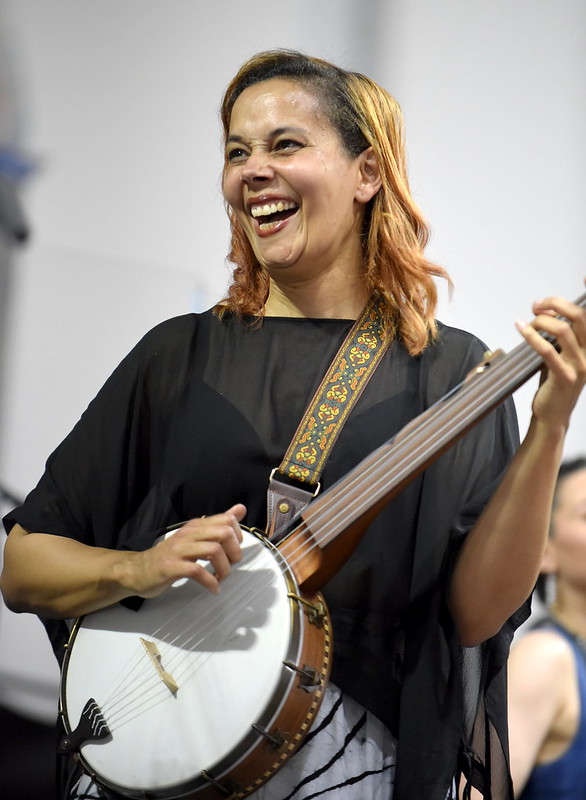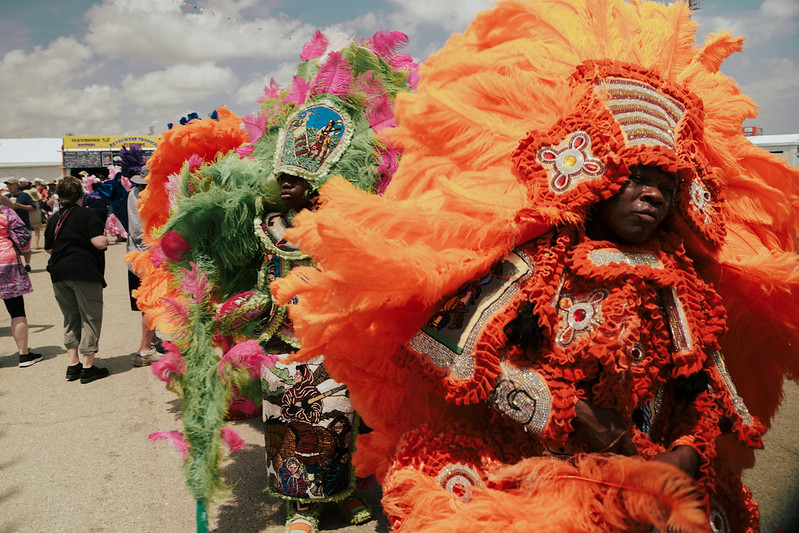Saturday and the gates open unexpectedly early for Jazz Fest Day 7.
Neil Young
Neil Young‘s set with Crazy Horse took a while to get going. This is a band of 50-plus years’ standing that still improvises, so the grooves aren’t going to kick in every time out. The first half of their Jazz Fest set was perfectly fine, just that the tempo of “Cortez the Killer’ and “Down by the River” needed a bit of goosing, and the endings were more ragged than glorious (“We planned that all out,” Young deadpanned at one point). The Horse magic fully kicked in on “Powderfinger,” where he and guitarist Micah Nelson (standing in for Nils Lofgren, whose other boss Bruce Springsteen called) exchanged leads in and around the trademark harmony guitar part. From there they were airborne, with the lengthy “Love & Only Love” building momentum for its 13 minutes. Then came the surprise of the set: The rarely played “Ohio,” in honor of the anniversary of the event it was written about, the Kent State massacre. A perfectly furious “Fuckin’ Up” and a celebratory “Hey Hey, My My” took things higher. The only bummer, and a big one, was the lack of an encore when ten minutes remained in their timeslot, and “Rockin’ in the Free World” was done at the previous tour stops.
Feufollet
Tragedy hit the Cajun music world on Thursday when Chris Stafford, leader of one of the most progressive Cajun bands, Feufollet—was killed in a car crash. Steve Riley & the Mamou Playboys took their slot at Fais Do-Do, turning the set into a memorial that featured emotive tributes from Riley and Feufollet member Kelli Jones. The tone was low key and respectful, even with a singalong or two included (“It helps us get through when you sing,” Riley noted at one point). The set closed with “Bayou Ruler,” likely in Stafford’s honor. Meanwhile this writer was getting teary at the prospect of never seeing Stafford deliver Feufollet’s brilliant Cajunization of Brian Eno’s “Baby’s on Fire” again.
Paul Sanchez
Paul Sanchez’s Rolling Road Show is the closest thing Jazz Fest has to a Rolling Thunder Revue, with Sanchez turning the stage over to a handful of talented friends—which this time included Alex McMurray, Sonia Tetlow (whose birthday it was), and his niece Natasha, who sang a charming song about carrots. But Sanchez’s own songs still stand out for their warmth and wit, and I’m sure he spoke for more than a few out-of-town visitors when he asked the musical question, “Would it be all right if I said I love you tonight? Tomorrow it might even be true.”
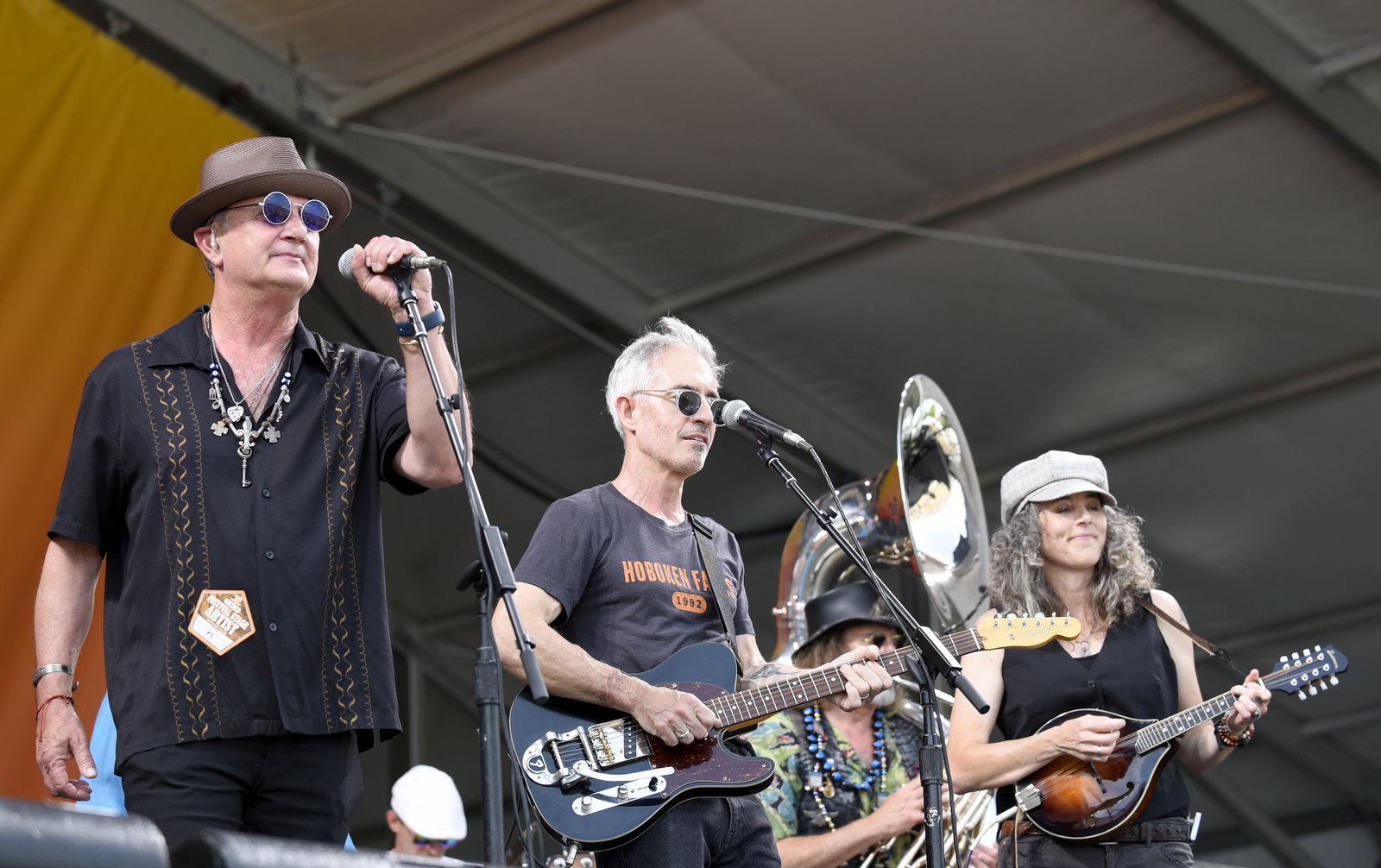
Paul Sanchez, with members of the “Road Show.” Photo by OffBeat / Kim Welsh
Joe Krown. Photo: OffBeat/ Kim Welsh
Joe Krown
Last time I saw Joe Krown at the Blues Tent, he was leading his classic organ trio, two-thirds of which (Russell Batiste and Walter Wolfman Washington) is now gone. This year Krown brought another stellar lineup, with drummer Eric Bolivar, bassist Cassandra Faulconer and guitarist Papa Mali (who have dozens of collective credits). The sound was less funk and more vintage R&B, with Krown favoring piano over the Hammond B3. Much of the set came from Krown’s recent Tribute album, including tunes by Booker, Fess and Dr. John. But with a lineup this good, it would be a waste to play anything strictly by the book, and so the vintage tunes were opened up to sharp interplay and soloing. Mali took the lead on Huey Smith’s “Don’t You Just Know It,” a celebratory way to start the day.
—Brett Milano
When it’s Saturday and the gates open unexpectedly early, what you do is you hit the most in-demand food booth. Today the surprise entrance made it all about Crawfish Monica from Big River Foods. Owner Pete Hilzim has been at Jazz Fest 40 plus years, most of that time in the same spot. Hilzim said, “The first dish we did here was Sauteed Shrimp and Eggplant Diablo. It was delicious, but we introduced Crawfish Monica the second year and it caught on.” You also know Hilzim from his friend, client, and business partner in setting up business to sell seasonings, Paul Prudhomme.
Hot Boy Ronald
The Congo Square Stage was the first destination, armed with tasty tradition and a nearby Strawberry Lemonade. First up was Hot Boy Ronald who stirred the crowd with lyrics like “We don’t talk,
we don’t play, all the crew in the streets saying ooh-nah-nay.” The guest highlight was Assata Renay’s version of Whitney Houston’s “I Have Nothing.” A bounce beat always wakes and shakes them, as did Renay’s star power stage presence.
Alfred Banks
Next up in the ring was Alfred Banks who can take on all comers regardless of weight class. Let’s be clear. There is no better rapper in New Orleans right now as long as the categories include lyricism, flow, range and style. Banks established his bonafides with a knack for sharp lyrics hand-in-hand with a catchy hook. He even sang too on “Alone.” As if all this wasn’t enough, guest Albert Allenback, the other Al of SaxKixAve joined for a few songs and even played SOS in Morse code on his saxophone. Their “Kaleidoscope” seemed to quadruple the growing crowd. Note to Jazz Fest—if you book Alfred Banks or SaxKixAve for a later slot, it will be a clear knockout, no TKO.
The Rumble
Staying at the Congo Square Stage, The Rumble is ready to rough-and-tumble with deep New Orleans tradition. Also, simply put, they rock. They’re aptly named, what with a rhythm section that sounds thicker and stronger than other potentially similar bands. Chief Joseph Boudreaux Jr. shone on “Trouble” and Aurelien Barnes delivered a strong “My People.” Do not miss them live. They’re a great band who have only just begun.
James Rivers
Legend James Rivers at the WWOZ Jazz Tent was must-see. When you catch a James Rivers performance you expect that a great saxophonist will wow you. You may not expect him to say, “I’m gonna dedicate the next tune to myself. Mind if I play some blues?” as an intro to his playing harmonica and flute. Unless your crystal ball is clearer than mine, you definitely don’t expect him to follow up a crowd-pleasing “What A Wonderful World” with a medley of “My Favorite Things”/ “Miss You” by The Rolling Stones / “Amazing Grace” on bagpipes. At that point, when anything was possible, Rivers simply closed the set with his version of “Blue Monday.”
Jon Cleary & the Absolute Monster Gentlemen
Jon Cleary & the Absolute Monster Gentlemen were ready to preach the New Orleans music gospel at the Festival Stage. This is a masterful band with a top pianist leading them whether locomotion-driving songs with ripping Cleary solos or the beautifully catchy
“When You Get Back.”
Glen David Andrews
A stone’s throw away at the Blues Tent, Glen David Andrews had a new album, Le Treme Carnaval, to showcase. Andrews is a masterful frontman, and whether he’s truly grasping to receive his blessings, fighting to block them—or both simultaneously—he makes you believe he’s going through it. He and his exceptional band, including Revert “Peanut” Andrews on trombone and Brett Gardner on guitar, turned “I Fought the Law” into an rocking riff-heavy amazement that was the mouth-dropping moment of the day alongside James Rivers. And that was only the second song in a strong set. There have been a number of versions of this song since its release in 1959 (most notably The Clash), but I put my money on Andrew’s rendition.
PJ Morton
With a Cochon de Lait Po-boy carefully protected for the walk back to the Congo Square Stage, there was no way I would miss PJ Morton. After DJ ANTWIGADEE! warmed up the crowd, Morton had an up-tempo start with a great musical vibe but one that obscured his lyrics into the instrumental bed for a few songs until he settled into a survey of his hits, including “Ready,” “Please Don’t Walk Away,” “My Peace,” “Say So,” and “Bring It On Home To Me.” Morton’s set was a strong reminder of his notable place in the modern American songbook.
Terrance Osborne
Terrance Osborne’s paintings are some of the most recognizable in modern New Orleans. His first Jazz Fest poster was in 2007, the notable Phil Frazier/Rebirth Brass Band piece that also had major city symbology during that time. At this point, he’s done three more Jazz Fest and two Congo Square posters. When asked about what he wants
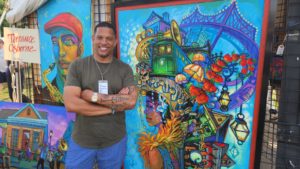
Terrance Osborne. Photo by Michael Allen Zell
visitors and clients to his booth to experience, Osborne emphasized, “What I want them to do is take away a piece of happiness. When I work on my work, I enjoy what I’m doing. If I’m not in a good space, when I work it puts me in a good space.”
Osborne went deeper. “I grew up in Treme. My mom did art as a hobby, so I picked it up from her,” he recalled. “I lived all over the city, because my parents moved around a lot. It was great. I liked being the new kid at school all the time. I was the kid who could draw. ‘Oh, wow. You did that? This guy’s cool.’ My mom did serene kind of scenes and covered the entire wall in her bedroom. The sun would cast on the wall and make everything vibrant. That had a big impact on my love for color.”
Here’s a survey of Saturday headliners, because I couldn’t choose just one.
Neil Young & Crazy Horse sounded stunningly strong, not only the clarity of Young’s lyrics, but the moody masterpieces the band unleashed to the Festival Stage crowd. “Cortez The Killer,” “Cinnamon Girl,” and “Down by the River” were a great trilogy among the mostly down-tempo marvels.
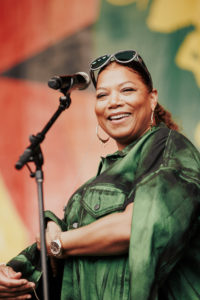
Queen Latifah. Photo by OffBeat / Noe Cugny
Queen Latifah was full of surprises. Though she went back to 1993 for “Just Another Day,” as she and her band turned the breakdown into a beautiful “Everybody Loves the Sunshine,” other than the most ardent fans, her focus on singing rather than rapping wasn’t expected. She realized as much, saying, “I know you’re wondering what’s going on up here. What’s happening is with rapping, TV, movies, singing, and more, you supported me on that. This is a musical journey,” as a lead-in to “California Dreaming.” Guest PJ Morton was an ideal duet partner on “Simply Beautiful,” as the Queen was all about catching and conveying a sunny spirited vibe.
Nathan & The Zydeco Cha Chas are always a crowd-pleaser. Frontman Nathan Williams, he of the perpetual shades, led a band so deep in the pocket, the beat was a mile wide for dancers. Williams made sure to dedicate “Why You Wanna Make Poor Cha Cha Cry?” to his wife Nancy on their 38th anniversary. Even after some of the other headlining stages had ended for the day, the steady zydeco beat rang through the Fair Grounds, funky and true.
—Michael Allen Zell
Kristin Diable has performed at Jazz Fest for 13 straight years (not counting COVID)… or is it 13 total Jazz Fests? Even she isn’t sure. Regardless, Diable’s sets, often at the Lagniappe or Fais Do Do stage, are must-sees and make fans of practically every passersby. With Johnny Campos (Lost Bayou Ramblers) on pedal steel and Charles Lumar ll (People Museum, Solange) on bass and a whole host of backing musicians and singers, this set was especially one not to miss.
Diable packed the setlist with both new songs and gems from her classic 2015 album Create Your Own Mythology, including “True Devotion” and “Hold Steady” (“I don’t know if I can hold steady/through all of the changes” and “It was a simple song/it did not change the world”). Sure, but it and the rest of the record was a solace through 2015, COVID, Fest cancellations, Hurricane Ida, and more.) On “True and Natural Man,” a still-unreleased track from the long-awaited next album, Diable and the band worked themselves into a rave-up by the end, with Diable bouncing in her boots and her background singer hitting ever-higher notes on the chorus. It seemed a natural closer, bringing everyone to their feet, but the band played on, and soon soothed us with a long piano intro while Diable tried to get her guitar in tune, finally abandoning it to sing instrument-less center stage. Soon, the actual melody started, and Diable whispered: “I went down to see my gypsy queen/she said, ‘my child, you have changed’/I went down to my father’s grave/nothing there had changed.”
Soon after Rhiannon Giddens and interviewer Gwen Thompkins took the Allison Miner Music Heritage Stage together, Thompkins mentioned that Giddens had co-written Beyoncé’s current, massive country hit. When the audience whooped, Giddens had no reaction, just as she did when her Pulitzer and MacArthur Genius grants, and other incredible achievements were mentioned. She was just here, it seemed, to talk about Jane Austen and the banjo. (“When you really dig into it, she really used her tools… to the utmost to tell people important things,” she said of Austen’s books).
Giddens heard a lot of Canadian and New England string and fiddle music growing up, all meant for 19th– and early 20th-century dances. “Dancers and kids are the real truth-tellers,” she said, half-kidding. “They’re telling you with their bodies… or yelling [about the music].” The Carolina Chocolate Drops, her landmark all-black bluegrass/Americana band, started out with dances at school functions, after all, “reconstructing our sounds today,” as she put it.
She gave us history lessons in the fiddle—“so important to black culture”—as some slaves bought their freedom through fiddle playing. “The black string band was like the traveling jukebox,” she said—and the banjo. “The guitar was expensive,” she pointed out, “until Sears’ mail-order from the factory” came along. She then played her fretless banjo, a replica of an 1858 edition, which gave her “every blues note I want. This is my ‘axe’,” she later added, “because it represents the crossroad of Africa and Europe for me. This represents poor people making music together.”
Man, I thought, I could listen to her play chords on the banjo all day. Later, at the Blues Tent, I miraculously did, to a rapturous reception.
Thompkins suggested that the banjo often gives off a sense “of melancholy… of trouble. Minor keys can break your heart on the piano, for instance,” she said, but the banjo can often create a “sense of unwellness.” But, as Giddens pointed out, the music is so damn infectious, most people don’t even notice. They simply get up, as we did, and dance.
Neil Young & Crazy Horse took the stage seven minutes early and, without the usual Quint introduction (or outro), launched straight into a blistering “Cortez The Killer,” one of the saddest songs ever written. But it was welcome, since I’d heard that Young had added in the famous “lost” verse (missing due to the tape running out on the one take Young was happy with in the studio.) Although a crew member had sound-checked an acoustic guitar, playing the riff from “Old Man”—that hit single—was absent, as was even a single acoustic performance. For his solo spotlight on the 54th anniversary of the Kent State massacre, Young brought out his CSNY hit about the tragedy, “Ohio,” on a Gretsch electric instead. During “Love and Only Love,” a child doing summersaults in the VIP section collapsed on his back and lay there, having rocked too hard, it seems. It would’ve been the perfect moment for Young to serenade him with “Old Man,” but the opportunity passed by.
—Brian Fairbanks

